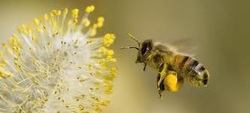Bee Pollen.

The bee pollen is the male seed of the flowers blossom, which is collected by the honey bees. It represents the main food source for the bees and contains proteins, minerals, fats and other substances, which are essential for their survival.
The composition varies according to the flower of provenience.
Generally it contains:
proteins, lipids, dietary fibre, pectin, minerals: potassium, magnesium, calcium, phosphorus, iron, zink, copper, manganese; vitamins: b-Carotene, B1, B2, B3, B5, B6, C, H, E; carbohydrates. As an average 100 g pollen contains: 20 g protein, 60 g carbohydrates 8 g fat and approx. 300 calories.
The antioxidant activity in pollen compared to that in most vegetable and fruits is 200 to 1000 times bigger.
This activity depends on the flower species and geographic origin.
Generally it contains:
proteins, lipids, dietary fibre, pectin, minerals: potassium, magnesium, calcium, phosphorus, iron, zink, copper, manganese; vitamins: b-Carotene, B1, B2, B3, B5, B6, C, H, E; carbohydrates. As an average 100 g pollen contains: 20 g protein, 60 g carbohydrates 8 g fat and approx. 300 calories.
The antioxidant activity in pollen compared to that in most vegetable and fruits is 200 to 1000 times bigger.
This activity depends on the flower species and geographic origin.


